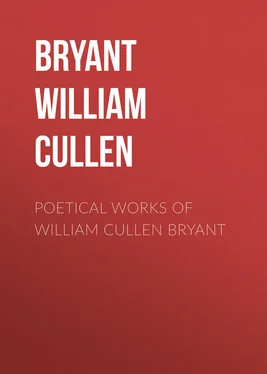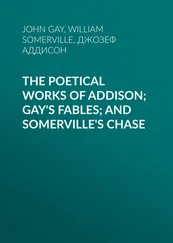William Bryant - Poetical Works of William Cullen Bryant
Здесь есть возможность читать онлайн «William Bryant - Poetical Works of William Cullen Bryant» — ознакомительный отрывок электронной книги совершенно бесплатно, а после прочтения отрывка купить полную версию. В некоторых случаях можно слушать аудио, скачать через торрент в формате fb2 и присутствует краткое содержание. ISBN: , Жанр: foreign_antique, foreign_prose, foreign_poetry, на английском языке. Описание произведения, (предисловие) а так же отзывы посетителей доступны на портале библиотеки ЛибКат.
- Название:Poetical Works of William Cullen Bryant
- Автор:
- Жанр:
- Год:неизвестен
- ISBN:http://www.gutenberg.org/ebooks/29700
- Рейтинг книги:3 / 5. Голосов: 1
-
Избранное:Добавить в избранное
- Отзывы:
-
Ваша оценка:
- 60
- 1
- 2
- 3
- 4
- 5
Poetical Works of William Cullen Bryant: краткое содержание, описание и аннотация
Предлагаем к чтению аннотацию, описание, краткое содержание или предисловие (зависит от того, что написал сам автор книги «Poetical Works of William Cullen Bryant»). Если вы не нашли необходимую информацию о книге — напишите в комментариях, мы постараемся отыскать её.
Poetical Works of William Cullen Bryant — читать онлайн ознакомительный отрывок
Ниже представлен текст книги, разбитый по страницам. Система сохранения места последней прочитанной страницы, позволяет с удобством читать онлайн бесплатно книгу «Poetical Works of William Cullen Bryant», без необходимости каждый раз заново искать на чём Вы остановились. Поставьте закладку, и сможете в любой момент перейти на страницу, на которой закончили чтение.
Интервал:
Закладка:
In lawns the murmuring bee is heard,
The wooing ring-dove in the shade;
On thy soft breath, the new-fledged bird
Takes wing, half happy, half afraid.
Ah! thou art like our wayward race; —
When not a shade of pain or ill
Dims the bright smile of Nature's face,
Thou lov'st to sigh and murmur still.
THE BURIAL-PLACE. 2 2 The first half of this fragment may seem to the reader borrowed from the essay on Rural Funerals in the fourth number of "The Sketch-book." The lines were, however, written more than a year before that number appeared. The poem, unfinished as it is, would hardly have been admitted into this collection, had not the author been unwilling to lose what had the honor of resembling so beautiful a composition.
Erewhile, on England's pleasant shores, our sires
Left not their churchyards unadorned with shades
Or blossoms, but indulgent to the strong
And natural dread of man's last home, the grave,
Its frost and silence – they disposed around,
To soothe the melancholy spirit that dwelt
Too sadly on life's close, the forms and hues
Of vegetable beauty. There the yew,
Green ever amid the snows of winter, told
Of immortality, and gracefully
The willow, a perpetual mourner, drooped;
And there the gadding woodbine crept about,
And there the ancient ivy. From the spot
Where the sweet maiden, in her blossoming years
Cut off, was laid with streaming eyes, and hands
That trembled as they placed her there, the rose
Sprung modest, on bowed stalk, and better spoke
Her graces, than the proudest monument.
There children set about their playmate's grave
The pansy. On the infant's little bed,
Wet at its planting with maternal tears,
Emblem of early sweetness, early death,
Nestled the lowly primrose. Childless dames,
And maids that would not raise the reddened eye —
Orphans, from whose young lids the light of joy
Fled early – silent lovers, who had given
All that they lived for to the arms of earth,
Came often, o'er the recent graves to strew
Their offerings, rue, and rosemary, and flowers.
The pilgrim bands who passed the sea to keep
Their Sabbaths in the eye of God alone,
In his wide temple of the wilderness,
Brought not these simple customs of the heart
With them. It might be, while they laid their dead
By the vast solemn skirts of the old groves,
And the fresh virgin soil poured forth strange flowers
About their graves; and the familiar shades
Of their own native isle, and wonted blooms,
And herbs were wanting, which the pious hand
Might plant or scatter there, these gentle rites
Passed out of use. Now they are scarcely known,
And rarely in our borders may you meet
The tall larch, sighing in the burial-place,
Or willow, trailing low its boughs to hide
The gleaming marble. Naked rows of graves
And melancholy ranks of monuments
Are seen instead, where the coarse grass, between,
Shoots up its dull green spikes, and in the wind
Hisses, and the neglected bramble nigh,
Offers its berries to the schoolboy's hand,
In vain – they grow too near the dead. Yet here,
Nature, rebuking the neglect of man,
Plants often, by the ancient mossy stone,
The brier-rose, and upon the broken turf
That clothes the fresher grave, the strawberry plant
Sprinkles its swell with blossoms, and lays forth
Her ruddy, pouting fruit…
"BLESSED ARE THEY THAT MOURN."
Oh, deem not they are blest alone
Whose lives a peaceful tenor keep;
The Power who pities man, hath shown
A blessing for the eyes that weep.
The light of smiles shall fill again
The lids that overflow with tears;
And weary hours of woe and pain
Are promises of happier years.
There is a day of sunny rest
For every dark and troubled night:
And grief may hide an evening guest,
But joy shall come with early light.
And thou, who, o'er thy friend's low bier,
Dost shed the bitter drops like rain,
Hope that a brighter, happier sphere
Will give him to thy arms again.
Nor let the good man's trust depart,
Though life its common gifts deny, —
Though with a pierced and bleeding heart
And spurned of men, he goes to die.
For God hath marked each sorrowing day
And numbered every secret tear,
And heaven's long age of bliss shall pay
For all his children suffer here.
"NO MAN KNOWETH HIS SEPULCHRE."
When he, who, from the scourge of wrong,
Aroused the Hebrew tribes to fly,
Saw the fair region, promised long,
And bowed him on the hills to die;
God made his grave, to men unknown,
Where Moab's rocks a vale infold,
And laid the aged seer alone
To slumber while the world grows old.
Thus still, whene'er the good and just
Close the dim eye on life and pain,
Heaven watches o'er their sleeping dust
Till the pure spirit comes again.
Though nameless, trampled, and forgot,
His servant's humble ashes lie,
Yet God hath marked and sealed the spot,
To call its inmate to the sky.
A WALK AT SUNSET
When insect wings are glistening in the beam
Of the low sun, and mountain-tops are bright,
Oh, let me, by the crystal valley-stream,
Wander amid the mild and mellow light;
And while the wood-thrush pipes his evening lay,
Give me one lonely hour to hymn the setting day.
Oh, sun! that o'er the western mountains now
Go'st down in glory! ever beautiful
And blessed is thy radiance, whether thou
Colorest the eastern heaven and night-mist cool,
Till the bright day-star vanish, or on high
Climbest and streamest thy white splendors from mid-sky.
Yet, loveliest are thy setting smiles, and fair,
Fairest of all that earth beholds, the hues,
That live among the clouds, and flush the air,
Lingering and deepening at the hour of dews.
Then softest gales are breathed, and softest heard
The plaining voice of streams, and pensive note of bird.
They who here roamed, of yore, the forest wide,
Felt, by such charm, their simple bosoms won;
They deemed their quivered warrior, when he died,
Went to bright isles beneath the setting sun;
Where winds are aye at peace, and skies are fair,
And purple-skirted clouds curtain the crimson air.
So, with the glories of the dying day,
Its thousand trembling lights and changing hues,
The memory of the brave who passed away
Tenderly mingled; – fitting hour to muse
On such grave theme, and sweet the dream that shed
Brightness and beauty round the destiny of the dead.
For ages, on the silent forests here,
Thy beams did fall before the red man came
To dwell beneath them; in their shade the deer
Fed, and feared not the arrow's deadly aim.
Nor tree was felled, in all that world of woods,
Save by the beaver's tooth, or winds, or rush of floods.
Then came the hunter tribes, and thou didst look,
For ages, on their deeds in the hard chase,
And well-fought wars; green sod and silver brook
Took the first stain of blood; before thy face
The warrior generations came and passed,
And glory was laid up for many an age to last.
Интервал:
Закладка:
Похожие книги на «Poetical Works of William Cullen Bryant»
Представляем Вашему вниманию похожие книги на «Poetical Works of William Cullen Bryant» списком для выбора. Мы отобрали схожую по названию и смыслу литературу в надежде предоставить читателям больше вариантов отыскать новые, интересные, ещё непрочитанные произведения.
Обсуждение, отзывы о книге «Poetical Works of William Cullen Bryant» и просто собственные мнения читателей. Оставьте ваши комментарии, напишите, что Вы думаете о произведении, его смысле или главных героях. Укажите что конкретно понравилось, а что нет, и почему Вы так считаете.












